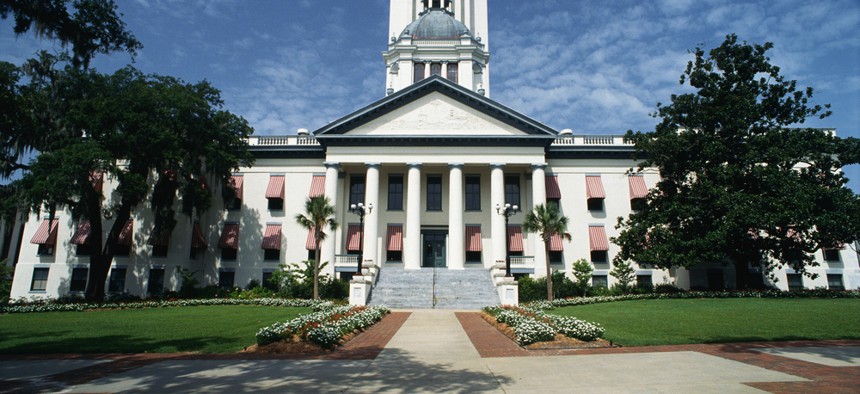Florida's Legislative 'Fair Districts' Still Aren't Fair

Florida's Capitol complex in Tallahassee. Shutterstock

Connecting state and local government leaders
A judge ruled that GOP operatives manipulated Sunshine State voting maps.
Despite Florida voters' recent approval of "fair districts" amendments to the state constitution, a judge on Thursday ruled that a portion of the state's voter maps still aren't, well, fair. Florida Circuit Judge Terry Lewis ordered a do-over on the maps, which he says were compiled with the help of GOP operatives and primarily benefit Republican incumbents in the legislature. As the Associated Press notes, the decision probably won't force a redraw before this year's midterm elections, as the state is almost certain to appeal.
In 2010, Florida voters approved a series of amendments designed to prohibit just the sort of thing that the judge believes happened in this case. The "Fair Districts" amendments are supposed to prohibit the state legislature from drawing state districts to intentionally favor a party or incumbent, a process known as "gerrymandering." Democrats are a majority by population in Florida, but a minority in its legislature. Lewis's decision pertains to just a few districts in the state, but if his decision is upheld the required redrawing will have a broad effect on the map, as neighboring districts will also need to be tweaked. The judge singled out two Central Florida districts as illegal in his decision, one held by an incumbent Democrat and one by a Republican. The Orlando Sentinel explains:
Lewis wrote the case "goes to the very foundation of our representative democracy," and found fault with Central Florida districts in particular -- District 5 held by Brown, D-Jacksonville, which Lewis wrote was unnecessarily drawn to protect Brown, and District 10 held by Webster, R-Winter Garden, which "was drawn to benefit the Republican Party and the incumbent."
As the AP reported, not all of the evidence considered by Lewis was made public, particularly when it comes to the accusations of GOP operative involvement in the drawing of the maps. But in his ruling, he said that the evidence suggested a "conspiracy to influence and manipulate the Legislature into a violation of its constitutional duty," adding that "they made a mockery of the Legislature's proclaimed transparent and open process of redistricting by doing all of this in the shadow of the process." To make things even harder to discern, a lot of the documentation around the creation of the district maps has since been destroyed, as the New York Times notes.
If the legislature appeals the decision, it will go to the Florida Supreme Court to decide. If the high court upholds Lewis's opinion, then a large portion of Florida's map must be redrawn, quite possibly by the 2016 elections. It's not clear, however, whether that task would fall to the legislature once again, or to the courts.
(Image via Spirit of America/Shutterstock.com)
NEXT STORY: Back to 'Abnormal' in Post-Katrina New Orleans




